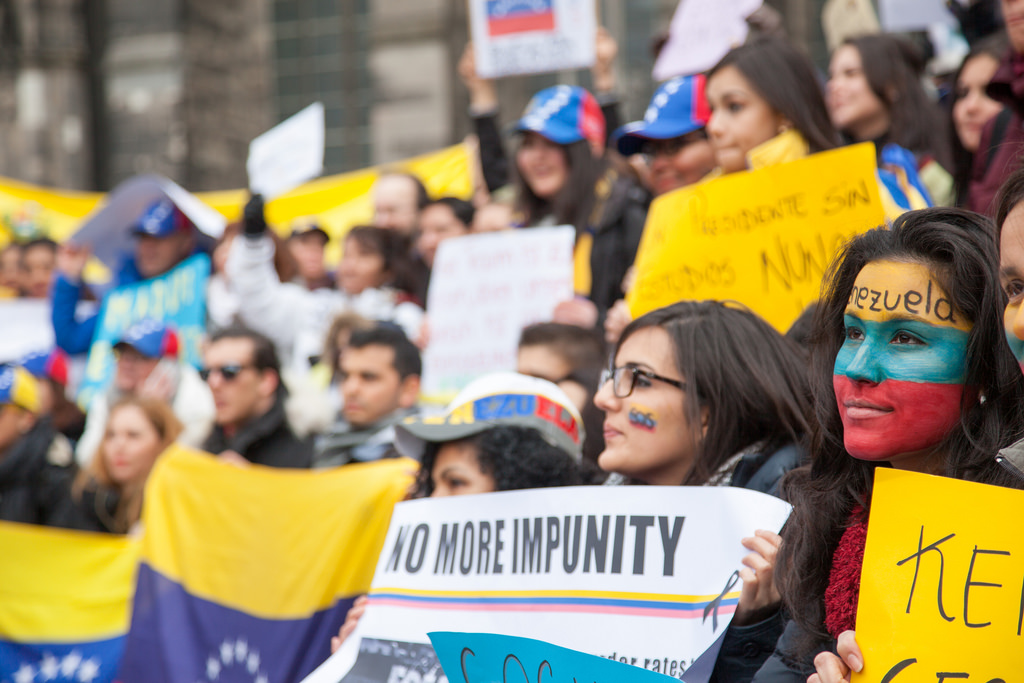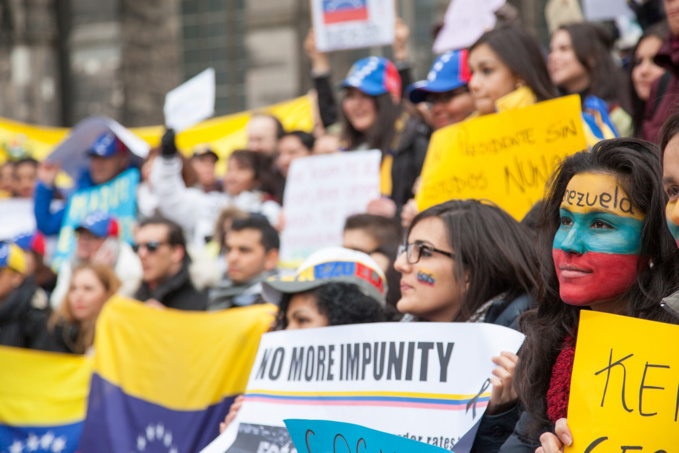Julio Borges, the leader of the opposition-controlled congress, wrote in a letter to Goldman's head Lloyd Blankfein that "obviously, Goldman Sachs decided to quickly rid the Venezuelan people of suffering": "Given the dubious nature of this deal and the ridiculous financial conditions associated with Venezuela and its people, The National Assembly will soon begin an investigation on this issue, and I also intend to recommend to any future democratic government of Venezuela not to recognize these bonds and not pay them".
According to the Wall Street Journal, Goldman Sachs paid only $ 865 million for bonds worth $ 2.8 billion issued by the state oil company Petroleos de Venezuela, or PDVSA, as early as 2014. Their maturity dates back to 2022, and this value implies an annual yield above 40%.
This is slightly higher than the yield on sovereign bonds of Venezuela, but PDVSA has even more problems and it should be taken into account, too. Venezuela’s total debt now amounts to $ 66.28 billion. At the same time, the debt market’s state is already desperately signaling a crisis. According to the opposition, such a deal subsidized Nicolas Maduro’s regime.
Goldman Sachs emphasizes that the bank did not interact with the government when buying bonds, as the deal took place in the secondary market with brokers’ help. In addition, securities are stored in customers’ accounts managed by the bank. "We are investing in PDVSA bonds because, like many in the asset management industry, we believe that the situation in the country will improve over time", the report says.
Analysts also noted that similar investments through mutual funds, stock indices and ETF, which also have PDVSA bonds, are conducted daily by investors around the world.
Although Goldman Sachs are really right formally, Wall Street Journal’s sources note that these bonds were held by the central bank of Venezuela. In addition, the risk of default makes profitability a very attractive opportunity for those who are willing to take risks.
For Goldman Sachs, the redemption of bonds is part of the strategy of increasing positions in Venezuelan assets. Apparently, large investors are preparing for a change of power and a possible economic collapse, buying cheap assets in advance.
The main problem is quite different. The opposition carefully insists that any purchase of Venezuelan bonds gives the regime the necessary funds. This, of course, is very far from the truth, but it can work to intensify protests and unrest. People are actively protesting against Maduro's regime. Since the beginning of April, more than 50 people have been killed in protests and demonstrations. And if this opposition comes to power, it will receive a formal excuse not to pay the former government’s debts, since they were created to finance the "criminal" regime, in their view.
That's just such statements, most likely, will remain only words, since defaults on debt mean a default, that is, the debt market for Caracas in this case will be closed. Even with the departure of Maduro, the economic situation will remain disastrous, it will take many years and billions of investments to stabilize the economic situation. Therefore, now the opposition's attack on Goldman Sachs is just a convenient way to increase pressure on the authorities and get political points from the population, since the history of confrontation with the US has deep roots.
The United States has long had views on Venezuela, which has the largest oil reserves in the world, especially after the "revolution" that began after the election of the late President Hugo Chávez and continued under the leadership of his successor, Nicholas Maduro. The US government seemed intent on creating a situation that Maduro's administration would have exhausted itself, so there's no point in accusing Goldman Sachs of financing Maduro.
In addition, the United States has already imposed separate sanctions against the country three times this year, and in the coming months more sanctions are planned, as indicated by the introduction of a recent bill in the US Senate that targets Venezuelan officials. The bill on "Humanitarian assistance to Venezuela and the protection of democratic governance" (S.1018) will pour $ 20 million into the Venezuelan opposition, which has already received about $ 50-60 million since the election of Chavez in 1998.
source: wsj.com
According to the Wall Street Journal, Goldman Sachs paid only $ 865 million for bonds worth $ 2.8 billion issued by the state oil company Petroleos de Venezuela, or PDVSA, as early as 2014. Their maturity dates back to 2022, and this value implies an annual yield above 40%.
This is slightly higher than the yield on sovereign bonds of Venezuela, but PDVSA has even more problems and it should be taken into account, too. Venezuela’s total debt now amounts to $ 66.28 billion. At the same time, the debt market’s state is already desperately signaling a crisis. According to the opposition, such a deal subsidized Nicolas Maduro’s regime.
Goldman Sachs emphasizes that the bank did not interact with the government when buying bonds, as the deal took place in the secondary market with brokers’ help. In addition, securities are stored in customers’ accounts managed by the bank. "We are investing in PDVSA bonds because, like many in the asset management industry, we believe that the situation in the country will improve over time", the report says.
Analysts also noted that similar investments through mutual funds, stock indices and ETF, which also have PDVSA bonds, are conducted daily by investors around the world.
Although Goldman Sachs are really right formally, Wall Street Journal’s sources note that these bonds were held by the central bank of Venezuela. In addition, the risk of default makes profitability a very attractive opportunity for those who are willing to take risks.
For Goldman Sachs, the redemption of bonds is part of the strategy of increasing positions in Venezuelan assets. Apparently, large investors are preparing for a change of power and a possible economic collapse, buying cheap assets in advance.
The main problem is quite different. The opposition carefully insists that any purchase of Venezuelan bonds gives the regime the necessary funds. This, of course, is very far from the truth, but it can work to intensify protests and unrest. People are actively protesting against Maduro's regime. Since the beginning of April, more than 50 people have been killed in protests and demonstrations. And if this opposition comes to power, it will receive a formal excuse not to pay the former government’s debts, since they were created to finance the "criminal" regime, in their view.
That's just such statements, most likely, will remain only words, since defaults on debt mean a default, that is, the debt market for Caracas in this case will be closed. Even with the departure of Maduro, the economic situation will remain disastrous, it will take many years and billions of investments to stabilize the economic situation. Therefore, now the opposition's attack on Goldman Sachs is just a convenient way to increase pressure on the authorities and get political points from the population, since the history of confrontation with the US has deep roots.
The United States has long had views on Venezuela, which has the largest oil reserves in the world, especially after the "revolution" that began after the election of the late President Hugo Chávez and continued under the leadership of his successor, Nicholas Maduro. The US government seemed intent on creating a situation that Maduro's administration would have exhausted itself, so there's no point in accusing Goldman Sachs of financing Maduro.
In addition, the United States has already imposed separate sanctions against the country three times this year, and in the coming months more sanctions are planned, as indicated by the introduction of a recent bill in the US Senate that targets Venezuelan officials. The bill on "Humanitarian assistance to Venezuela and the protection of democratic governance" (S.1018) will pour $ 20 million into the Venezuelan opposition, which has already received about $ 50-60 million since the election of Chavez in 1998.
source: wsj.com



















